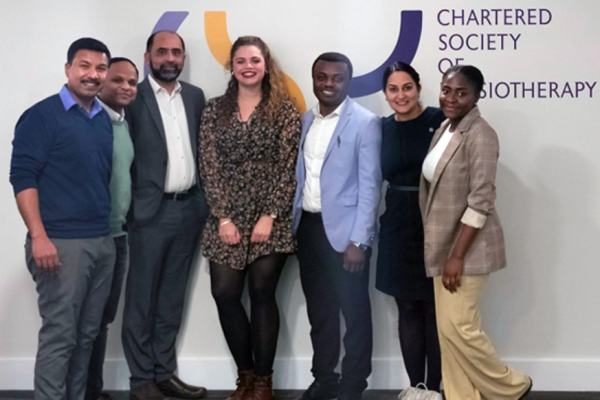Find out where you can look for jobs, and how to apply
Where do I look for jobs in the UK?
There are many places and ways you can look for jobs in the UK and set up alerts to receive them directly into your inbox.
The most frequently used are the job sites for work in the national health service.
- NHS jobs in England and Wales
- NHS Scotland recruitment
- Health and social care jobs in Northern Ireland
On these site you can select the geographical area, banding or salary and you can set up an alert for any new jobs posted.
You can also look at the CSP’s job site, which will have a mixture of NHS and independent practice jobs advertised.
Deepshikha KapoorI would look into the NHS, private sector, care homes, universities and colleges. Explore all the options!
Listen to advice on employment and networking from Vijo Mathew, a physiotherapist who moved from India to the UK in 2016 and now works in England.
How do I apply and make my experience relevant to the job?
Physiotherapists who trained outside the UK offer some advice on applying for jobs
It's important to look at the job description of any role you apply for. You'll be more successful if you tailor your personal statement or CV for the specific job you are applying for.
Employers can tell when you have copied and pasted your personal statement from one application to another without editing it or studying the role you’re applying for.
Preparing for interview success
Physiotherapists who trained outside the UK give their top tips for interview success
Your hard work has paid off and you’ve been invited for an interview, well done!
This is your opportunity to demonstrate your qualifications and knowledge, your interest in the role and your personality.
Taking some time to prepare for the interview will help you feel calm and confident on the day.
- What to focus on when preparing for interviews
- Watch our internationally trained members talk about how best to ace that interview
Members' top tips for interview success
Physiotherapist Ugwueze Nwafor moved to the UK from Nigeria in 2019 and now works in Wales as a senior physiotherapist.Listen to his advice on how physios trained outside the UK can succeed in job interviews.
Vijo Mathew is a therapy manager/clinical lead physio working in England, who trained in India. His top tips for when you're going for an interview are:
- understand the job you have applied for
- get in touch with the contact person mentioned in the advert and talk to them to find out what actually is the job, what it entails and whether it interests you
- read the job description and person specification carefully and tailor your answers to these.
The STAR technique
Physiotherapist Dora Molnar moved to the UK from Hungary in 2019. She started her career in the UK as a band 4 support worker to gain NHS experience and now works as a senior physiotherapist in Liverpool.
Dora’s tip for interview success is to think about different situations from your clinical experience and create case studies which you can use to demonstrate your ability in the interviews. This can be done using the STAR technique - Situation, task, action result.
The STAR technique in action
Could you please tell us about a time when you worked well within a team?
Situation: A patient who had survived a stroke was discharged from hospital to continue her rehabilitation in the community. The community stroke team accepted her referral and I went out to assess her. She wasn’t able to mobilise and her main goal was to improve this.
The whole multidisciplinary team (MDT) was involved in her care but I saw her the most. I soon noticed that she kept repeating the same questions and often called the office to ask about issues that had already been discussed. She and her family also didn’t follow our advice. My occupational therapist colleague carried out a cognitive assessment which showed that the patient had impaired memory.
Task: The patient wanted to get better and progress towards her goals but her memory impairment made this much more difficult.
Action: After discussing this at the MDT meeting, I suggested that the patient should have a therapy folder where we could provide written information for her. Everyone who worked with the patient added their part of her care plan and I contacted the GP and pharmacist to provide written information about the reviews. When a member of the MDT treated the patient, they left a description of what happened during the session, what the patient needed to do, and what the family should do to help the patient reach her goals. We encouraged the patient and family to regularly review this folder.
Result: The patient’s memory issue was addressed and treated by the whole MDT using the therapy folder and by providing written information. She stopped calling the office to ask the same questions and her family came on board with our recommendations. She was discharged from our team able to walk with a walking stick.
I got the job, what now?
If you are successful at interview, carefully check your contract before signing it.
Ensure it describes the job you thought you had applied for, along with any restrictions that may be imposed on your practice, as and when you leave the job.
If you are a member, the CSP is here to support and protect you in the workplace.
Salil Parkar, Physiotherapist trained in IndiaYou will find plenty of opportunities to develop and progress your career here in UK as the scope of practice for physiotherapy clinical development is constantly expanding. Equally, there are other pathways to develop your career into academic or management and leadership positions.
I didn’t get an interview, can I ask for feedback?
Absolutely, you are seeking advice into why you weren’t shortlisted for interview. This feedback can be helpful in your next application.
Employers are not legally obliged to provide feedback but many will if you ask.
What if I don’t get the job after my interview?
It's very common to ask for and receive feedback about your performance at interview if you are not successful.
This feedback can be helpful in giving you insight into how you could improve next time. This is how you can understand what you did well and what you need to improve on. Employers are not obliged to give you feedback but many will.
If you are refused feedback, you can make a freedom of information request to see the notes made at interview which will give you an idea of where you did well and where you can improve.
What should I be concerned about when receiving feedback about why I didn’t get the job?
Sometimes feedback about why you didn’t get a job can raise some alarm bells to potentially unjustified reasons for you not being successful. If you are concerned about this you can contact the CSP for more advice.
For example, it would be inappropriate for an employer to say: 'I don’t see you as a part of this team' or 'your face just doesn’t fit'.
However, it would be reasonable for an employer to say that your level of experience is not suitable for the job you have applied for or that there was another candidate with more experience than you.
Dora Molnar, physiotherapist trained in HungaryI didn’t give up, even after a few unsuccessful interviews. Don’t give up, just go for it!
Acknowledgements

The videos on this page were produced in conjunction with NHS England.
The CSP would also like to thank our internationally trained members for their participation in this project (left to right): Vijo Mathew, Salil Parker, Muhammad Chishti, Dora Molnar, Ugwueze Nwafor, Deepshikha Kapoor, and Modupe Bolarin.







































